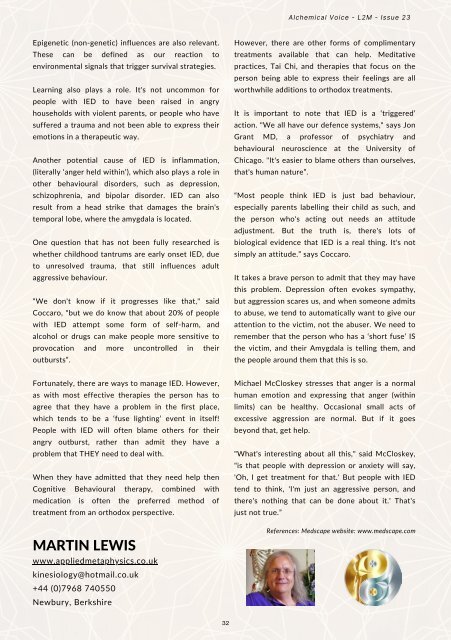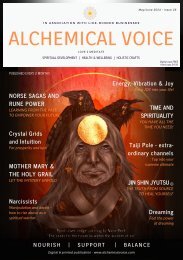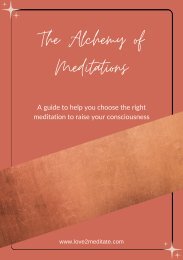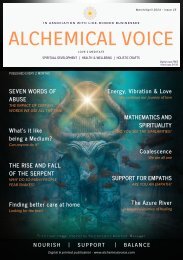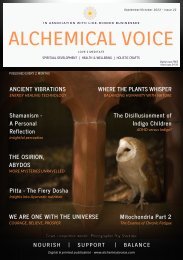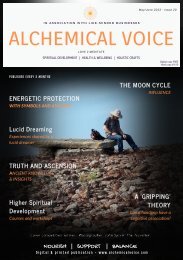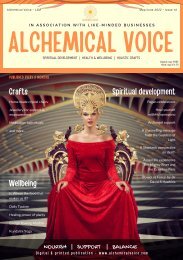November/December 2023 Alchemical Voice
In our November/December issue, read about Yule time ideas and the crystals for now written by Sue Penney of Soul Verse. John Sjovik provides two articles, one called 'Another Day' and the other called 'Nature Spirits - A rain forest visit'. Nasreen Pritchard talks about her journey with Cacao. Julie de Vere Hunt blesses us with further insights into Mary Magdalene 'Magdalen Papyrus'. Our very own Dream Builder Life Coach and Angel Expert Carol Coggan has written an article called Roots/Routes. Energy Psychologist, Martin Lewis talks about the Amygdala and Intermittent Explosive Disorder (IED). Ayurvedic Practitioner and Yoga Therapist Claire Sparks writes about the Vata Dosha in this edition - The Airy Essence. Hannah Gauss asks 'What is that you truly desire?' Read about what happened with Avebury Henge ritual carried out by Julie de Vere Hunt, Martin Lewis and Jovi Hoonjan.
In our November/December issue, read about Yule time ideas and the crystals for now written by Sue Penney of Soul Verse. John Sjovik provides two articles, one called 'Another Day' and the other called 'Nature Spirits - A rain forest visit'. Nasreen Pritchard talks about her journey with Cacao. Julie de Vere Hunt blesses us with further insights into Mary Magdalene 'Magdalen Papyrus'. Our very own Dream Builder Life Coach and Angel Expert Carol Coggan has written an article called Roots/Routes. Energy Psychologist, Martin Lewis talks about the Amygdala and Intermittent Explosive Disorder (IED). Ayurvedic Practitioner and Yoga Therapist Claire Sparks writes about the Vata Dosha in this edition - The Airy Essence. Hannah Gauss asks 'What is that you truly desire?' Read about what happened with Avebury Henge ritual carried out by Julie de Vere Hunt, Martin Lewis and Jovi Hoonjan.
You also want an ePaper? Increase the reach of your titles
YUMPU automatically turns print PDFs into web optimized ePapers that Google loves.
<strong>Alchemical</strong> <strong>Voice</strong> - L2M - Issue 23<br />
Epigenetic (non-genetic) influences are also relevant.<br />
These can be defined as our reaction to<br />
environmental signals that trigger survival strategies.<br />
Learning also plays a role. It's not uncommon for<br />
people with IED to have been raised in angry<br />
households with violent parents, or people who have<br />
suffered a trauma and not been able to express their<br />
emotions in a therapeutic way.<br />
Another potential cause of IED is inflammation,<br />
(literally ‘anger held within’), which also plays a role in<br />
other behavioural disorders, such as depression,<br />
schizophrenia, and bipolar disorder. IED can also<br />
result from a head strike that damages the brain's<br />
temporal lobe, where the amygdala is located.<br />
One question that has not been fully researched is<br />
whether childhood tantrums are early onset IED, due<br />
to unresolved trauma, that still influences adult<br />
aggressive behaviour.<br />
"We don't know if it progresses like that," said<br />
Coccaro, "but we do know that about 20% of people<br />
with IED attempt some form of self-harm, and<br />
alcohol or drugs can make people more sensitive to<br />
provocation and more uncontrolled in their<br />
outbursts”.<br />
However, there are other forms of complimentary<br />
treatments available that can help. Meditative<br />
practices, Tai Chi, and therapies that focus on the<br />
person being able to express their feelings are all<br />
worthwhile additions to orthodox treatments.<br />
It is important to note that IED is a ‘triggered’<br />
action. "We all have our defence systems," says Jon<br />
Grant MD, a professor of psychiatry and<br />
behavioural neuroscience at the University of<br />
Chicago. "It's easier to blame others than ourselves,<br />
that's human nature”.<br />
“Most people think IED is just bad behaviour,<br />
especially parents labelling their child as such, and<br />
the person who's acting out needs an attitude<br />
adjustment. But the truth is, there's lots of<br />
biological evidence that IED is a real thing. It's not<br />
simply an attitude.” says Coccaro.<br />
It takes a brave person to admit that they may have<br />
this problem. Depression often evokes sympathy,<br />
but aggression scares us, and when someone admits<br />
to abuse, we tend to automatically want to give our<br />
attention to the victim, not the abuser. We need to<br />
remember that the person who has a ‘short fuse’ IS<br />
the victim, and their Amygdala is telling them, and<br />
the people around them that this is so.<br />
Fortunately, there are ways to manage IED. However,<br />
as with most effective therapies the person has to<br />
agree that they have a problem in the first place,<br />
which tends to be a ‘fuse lighting’ event in itself!<br />
People with IED will often blame others for their<br />
angry outburst, rather than admit they have a<br />
problem that THEY need to deal with.<br />
When they have admitted that they need help then<br />
Cognitive Behavioural therapy, combined with<br />
medication is often the preferred method of<br />
treatment from an orthodox perspective.<br />
MARTIN LEWIS<br />
www.appliedmetaphysics.co.uk<br />
kinesiology@hotmail.co.uk<br />
+44 (0)7968 740550<br />
Newbury, Berkshire<br />
Michael McCloskey stresses that anger is a normal<br />
human emotion and expressing that anger (within<br />
limits) can be healthy. Occasional small acts of<br />
excessive aggression are normal. But if it goes<br />
beyond that, get help.<br />
"What's interesting about all this," said McCloskey,<br />
"is that people with depression or anxiety will say,<br />
'Oh, I get treatment for that.' But people with IED<br />
tend to think, 'I'm just an aggressive person, and<br />
there's nothing that can be done about it.' That's<br />
just not true.”<br />
References: Medscape website: www.medscape.com<br />
32


